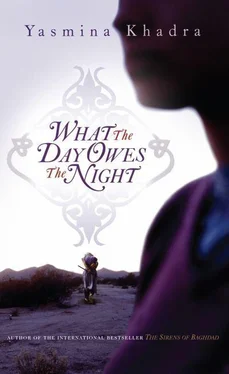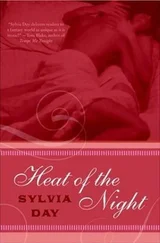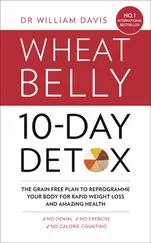‘Why do you talk such nonsense?’ said my father angrily.
‘Because you don’t know what you’re getting yourself into. The city is a wicked place. Barakah – the breath of life, the wisdom of our ancestors – has no power there. Those who go there never return.’
My father raised one hand, imploring him to keep his wild imaginings to himself.
‘I’ve come to sell you my cart. The wheels and the cart are solid and the mule is barely four years old. I’ll take whatever you can offer.’
‘I’m afraid I cannot offer much, Issa.’ The merchant looked at the mule and the trap. ‘Please do not think I would profit from your misfortune. Few travellers pass this way now and I am left with melons I cannot sell.’
‘Anything you can offer will be enough for me.’
‘To tell the truth, I have no need of a cart or a mule . . . But I have a little money, which I will happily share with you. You have helped me many times. As for the mule and cart, you can leave them here with me; I’ll find a buyer for you. You can come back and collect the money whenever you like. I won’t take a penny of it.’
My father did not hesitate; he had no choice. He held out his hand to shake on the deal.
‘You are a good man, Miloud. I know you would not cheat me.’
‘A man who cheats, cheats only himself.’
My father handed me two bundles, shouldered the others himself and, pocketing the few coins the merchant gave him, went to find my mother, never once looking back at what he was leaving behind.
We walked until we could no longer feel our legs. The sun was unbearable; its dazzling glare off the arid, desolate terrain stung our eyes. Swathed in her shroud, my mother stumbled like a ghost behind us, stopping only to shift my sister from one hip to the other. My father paid her no mind. He walked on, resolute, forcing us to run to keep up. There could be no question of us asking him to slow down. My heels were rubbed raw by my sandals, my throat burned, but I kept going. To stave off my hunger, my thirst, I focused on the steam rising from my father’s shoulders, on the way he carried his burden, his brutal, unvarying pace determined to trample any evil spirit in his path. Not once did he turn to see whether we were still following.
The sun was beginning to set by the time we reached the roumi track – by which he meant the tarmac road. My father chose a lone olive tree behind a small hill, safe from prying eyes, and began to lash the branches together to make a shelter for the night. Then, checking to ensure that he could still see the road, he told us we could set down our burdens. My mother laid the sleeping Zahra at the foot of the tree and covered her with a pagne, then took a crock pot and a wooden spoon from one of the bundles.
‘No fire,’ my father said, stopping her. ‘We can eat cured meat tonight.’
‘There is no meat. I have a few fresh eggs left.’
‘No fire, I said. I want no one to know that we are here. We will make do with tomatoes and onions.’
The oppressive heat died away and a cool breeze rustled the leaves and the branches of the olive tree. We could hear lizards darting through the dry grass. The sun spilled out across the horizon like a broken egg.
My father lay on his back in the shade of a boulder, one knee raised, his turban covering his face. He had eaten nothing. It was almost as though he was sulking.
Just before nightfall, a man appeared on a high ridge and waved at us. Out of modesty, he dared not come any closer while my mother was present. My father sent me to ask what he wanted. He was a shepherd, dressed in tattered rags, his face was wizened, his hands calloused. He offered us his shelter for the night. My father declined this hospitality. The shepherd insisted – his neighbours would not forgive him if he left a family to sleep outside when his little shack was nearby. My father categorically refused. ‘I will not be beholden to any man,’ he muttered to himself. The shepherd, annoyed, went back to his meagre flock of goats, grumbling and stamping his feet.
We spent the night beneath the stars. My mother and Zahra at the foot of the olive tree, me under my gandurah, my father sitting in the shadow of the rock, a cutlass between his feet, keeping watch.
When I woke in the morning, my father was a different man. He had shaved and washed his face in a nearby stream and put on clean clothes: a waistcoat over a faded shirt and a neatly pressed sarouel – a pair of loose-fitting trousers – I had never seen him wear before, and leather shoes, which, though shabby, had been freshly buffed.
The bus arrived just as the sun began to rise. My father packed our belongings on to the roof and sat us on a long bench at the back. This was the first time I had ever seen a bus. When it moved off, I clung to the seat, thrilled and terrified. The few other travellers dozed here and there, mostly roumis – Westerners – looking cramped in their shabby suits. I stared out of the windows at the landscape as it streamed past on either side. I was in awe of the bus driver. I could only see his back, which was broad as a rampart, and his broad, sinewy arms, which twisted the steering wheel with considerable authority. On my right sat a toothless old man with a tattered basket at his feet, who lurched from side to side with every hairpin bend. After each corner he would plunge his hand into the basket to make sure that everything was still as it should be.
The pungent petrol fumes and the closed windows finally got the better of me and, stomach churning, head feeling bloated as a rubber ball, I dozed off.
The bus stopped on a little square flanked by trees opposite a vast red-brick building. The travellers rushed for their bags. In their haste, some of them trod on my feet; I didn’t even notice. I was so dumbstruck by what I saw that I forgot to help my father take down our bundles.
The city.
I had never imagined that such a sprawling place could exist. It was extraordinary. For a moment I wondered if the heat and fumes were playing tricks on me. On the far side of the square, rows and rows of houses stretched as far as the eye could see, with tall windows and balconies filled with flowers. The streets were paved and there were footpaths on either side. I couldn’t believe my eyes; I did not even have names for many of the things that flashed before them. Beautiful houses rose up on every side, elegant and impressive, set back behind high black railings. Families relaxed on verandas around white tables on which stood tall decanters of orangeade, while rosy children with hair of gold played in the gardens, their high-pitched laughter bursting through the greenery like jets of water. These privileged residences exuded a sense of tranquillity and wealth that I could hardly believe possible, so different were they from life out in the bled, where crops withered to dust, where stables and barns were less pathetic than the shack we had called home.
This was a different planet.
I shambled along behind my father, dazzled by the parks bounded by low stone walls or wrought-iron railings, by the broad, sunlit avenues with their street lamps, majestic and aloof, like glowing sentinels. And the cars . . . ! I had seen at least a dozen cars. They appeared out of nowhere, sputtering like shooting stars, only to disappear around a corner before I had time to make a wish.
‘What’s the name of this country?’ I asked my father.
‘Shut up and walk,’ he snapped. ‘And keep your eyes on the road if you don’t want to fall into a hole.’
This was Oran.
My father walked straight ahead, sure-footed, undaunted by the grid of streets and their dizzying buildings that branched out all around us, each so like the others that it felt as though we were marking time. Curiously, I saw, the women in the city did not wear the veil. They walked around with their faces bare; the old women wore strange headgear, but the younger ones went bare-headed, their hair on show for all to see, seemingly unperturbed by the men all around them.
Читать дальше












